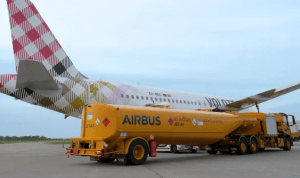Airbus expands usage of SAF

Today, the reduced carbon fuel is being increasingly used on Airbus sites and activities where a direct impact on carbon emissions can be made.
In line with its purpose to pioneer sustainable aerospace for a safe and united world, Airbus is working to reduce the environmental footprint of its products and services.
This includes efforts implemented in Airbus’ own manufacturing operations and facilities, the source of direct and indirect greenhouse gas emissions. Airbus has the ambition to reduce its Scope 1 & Scope 2 industrial emissions by up to 63% by 2030 compared to 2015, targeting the neutralisation of residual emissions.
Part of that ambition is Airbus’ commitment to support and act as a catalyst for the development and use of SAF - the progressive use of which is a major contributor to the company’s emissions-reduction roadmap.
SAF is essential in reaching this target and is part of a panel of solutions being developed and implemented to reduce the environmental impact of our operations. Today, reduced carbon fuel can provide on average 80 percent CO2 savings over the entire lifecycle when compared to traditional aviation fuel.
CurSustainable Aviation Fuels, technically certified to international specifications and standards, must have the same qualities and characteristics as Conventional Aviation Fuel (CAF) - otherwise known as “JET A1” - in order to substitute it. Currently regulators have approved that conventional “JET A1” can be fully replaced or combined with “drop-in” SAF inside any commercial aircraft fuel tanks. This means that SAF can be used as a standard fuel without modifications to an aircraft’s structure or systems.
Following Mobile, in the US, Finkenwerder in Hamburg, Germany, and Broughton, in the UK, two more Airbus facilities are progressively replacing conventional aviation fuels with SAF uptake.
Teams in both Toulouse, France, and Tianjin, China, have collaborated closely with local authorities and suppliers to enable and grow the availability and use of SAF for internal use.

















